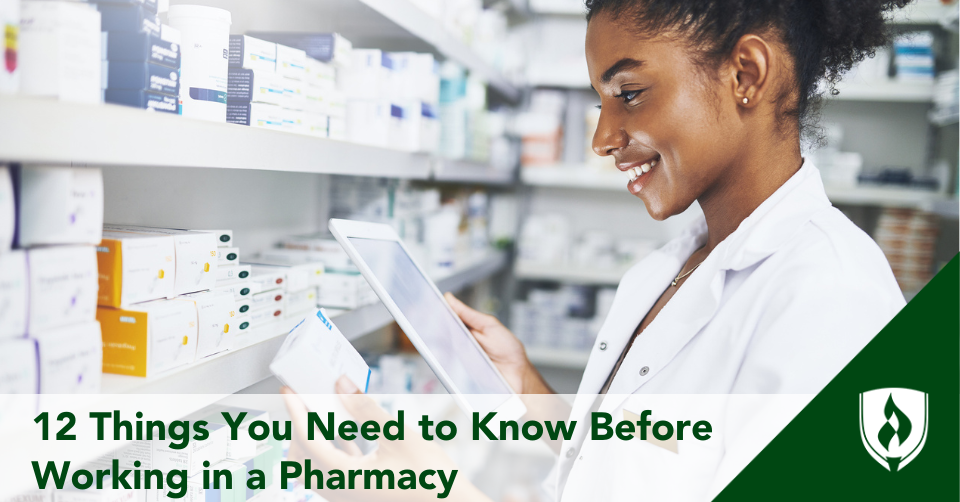
Beginning a new career is exciting. It’s a fresh start—a time of growth and learning. It’s an opportunity to make a better life for yourself and your family. And if you're considering a career in a healthcare environment, you’ll be engaging in work that helps people make better lives for themselves as well.
“Working in the pharmacy is a great way to be a part of the medical field and help others without dealing with blood and other body fluids,” says Rasmussen University adjunct instructor Amanda Vickery.
If you are considering how to become a pharmacy technician, you're looking at a lot of future time spent in pharmacies.
A pharmacy technician, also called pharmacy tech (or even pharm tech) works with health system pharmacists to measure and distribute medication. If you become a certified pharmacy technician, you could work in a pharmacy, helping patients access critical components of their care.
But before you start down a new career path, there are a few things you should know about how to become a pharmacy technician—and what to expect once you become one.
To give you a sneak peek of what it’s really like working in a pharmacy, we compiled a list of the top things you should know beforehand. This way, if you do decide to become a pharmacy technician, you'll have a better idea of what's coming.
What you need to know before working in a pharmacy
Here's a behind-the-scenes look at what's it's like to work in a pharmacy. Keep reading to determine if this work environment appeals to you.
1. Different types of pharmacies offer different working conditions
Though most people probably picture their local CVS when they think of a pharmacy, there are actually a bunch of different pharmacy settings you can work in. From retail pharmacies to hospital pharmacies, a range of locations allows pharmacy technicians to choose a setting they prefer.
“The variety of work environments suits people with a variety of personalities,” Vickery says.
“Those who are outgoing and enjoy customer service may prefer working in a retail pharmacy. Hospital pharmacies and mail order pharmacies are great choices for pharmacy technicians who do not care as much for customer service.”
There are also long-term care facility pharmacies, home care pharmacies and more. For a closer look at what kind of pharmacies are out there, check out “Types of Pharmacies: 7 Places People Pick up Prescriptions.”
Pharmacy technicians work in all kinds of places.
2. Pharmacy hours may be irregular
Many pharmacies are open at all hours. This can mean irregular schedules and night shifts for some pharmacy technicians. Early on in the career, a pharmacy technician may be more likely to get late or even overnight shifts.
Some pharmacies do keep regular 9-5 hours, so if the irregular hours would be a hardship, pharmacy technicians can apply for positions in those environments.
3. You’ll need excellent communication skills
Both pharmacy technicians and pharmacists must be able to interact with coworkers and customers in a professional manner. Vickery says pharmacy technicians working in retail settings absolutely need some customer service skills. In this position, you are often the first point of contact for patients.
Customers may have questions about their prescription, over-the-counter drugs or supplements that will need to be referred to the pharmacist.
Even if you work in a non-patient-facing pharmacy, your communication abilities and professional demeanor with physicians, insurance professionals and other pharmacy employees are vital for your success and for patient safety.
4. Pharmacy technician duties are growing
With an aging population and a growing number of individuals needing both medical and pharmaceutical care, the pharmacy industry is certainly not slowing down anytime soon. In fact, pharmacists are increasingly expanding their range of duties, and creating more types of tasks for pharmacy technicians.
An example? Many pharmacists now administer flu shots and COVID-19 vaccines, while they didn't before. Taking patient information, preparing medications and double-checking work may now be a larger part of the average pharmacy technician position.
On top of that, health systems are confusing and patients often come to pharmacy technicians with questions about where to go to get the help they need. A pharmacy technician can step in to direct people to the right healthcare location or professional.
5. You have to pay close attention to the details
Working in a pharmacy means handling and providing critical medications. Your actions could literally mean life or death for patients. Pharmacy law, is accordingly, very specific and very strict. Pharmacy techs do not mess around.
“Accuracy is very important,” Vickery says. “Making sure the patient receives the correct medication in the right dosage and that all calculations are performed correctly requires training and great attention to detail.”
A pharmacy technician program will focus on teaching you the skills you need to measure prescription medications and controlled substances.
Vickery says one of the most challenging parts of the job is to stay accurate while working very quickly. A pharmacist might have a consistent list of things to balance and get to all day, and pharmacy technicians can get totally bombarded by customers and patients.
It’s important to keep perspective on how crucial your work is, no matter how busy it gets.
6. The pharmacist is there to ensure accuracy
Despite the high-stakes nature of the pharmacy environment, a natural flow of double-checking will help ensure patient safety. A pharmacy technician measures and fills prescriptions, and pharmacists are there to check those details and ensure that all medications are filled properly.
“The pharmacist is there to answer questions, to catch errors and to counsel the patients regarding their medications,” Vickery says.
If you decide to become a pharmacy technician, you'll gain experience and learn when to direct patients or concerns to the pharmacist.
7. Math skills come in handy
Both pharmacists and pharm techs crunch numbers and use mathematics on a daily basis to ensure they give the right dosage and measurements to patients. Chemistry skills can also come in handy when ensuring compounds are mixed correctly for patients.
That said, it's okay if you don't remember every detail from high school math class—good pharmacy technician programs and similar certificate programs will help you brush up on the specific skills needed for the role.
8. You’ll want to know a thing or two about insurance
Given that it falls within in the healthcare industry, there’s also an insurance and billing side to a pharmacy tech career. When customers come to the pharmacy counter, you'll need to collect their insurance information and enter it to determine their copays or out of pocket costs.
If someone is confused about their health insurance (and isn't that everyone?) and they have to pay more than they thought or are seeing rejected insurance, they ask you for help.
“I was surprised by how complex insurance billing can be in a retail pharmacy,” Vickery says. “Resolving any insurance rejections is an important part of the pharmacy technician’s job.
9. You’ll spend most of the workday on your feet
You should invest in a comfortable pair of shoes if you decide to work in a pharmacy, because you’ll be constantly on the move.
Pharmacy technicians check inventory, fill prescriptions and interact with customers, and there’s not a lot of downtime. You should expect to be standing most of the day—so be prepared to spend a lot of time on your feet.
10. You have to meet requirements to work in a pharmacy
You can't just wander into a pharmacy job with your high school diploma and some good intentions. Pharmacies house tons of medication and controlled substances, and both pharmacy techs and pharmacists need education.
Requirements for pharmacy technicians will vary depending on the state you live in, but generally, they’ll include the following.
- Obtaining a high school diploma or GED
- Passing a criminal background check
- Completing education through a pharmacy technician certificate program
- Passing a pharmacy technician certification exam approved by the pharmacy technician certification board OR applying for a pharmacy technician license through your state
It’s important to note that the acronyms can get a little confusing.
The ExCPT® exam is a pharmacy technician certification exam offered by the National Healthcareer Association.
The PTCE® exam is a pharmacy technician certification offered by the pharmacy technician certification board.
Check with your state's pharmacy board to see which of the certifications they prefer. If you pass either of these exams and receive your certification, you can write CPhT (certified pharmacy technician) on your job applications.
A pharmacy technician will also likely have some on the job training as they acclimate to their organization.
11. Pharmacy technician training can happen relatively quickly
Compared to other healthcare roles, pharmacy technicians get to hit the ground running pretty quickly. At Rasmussen University, you can enroll in a pharmacy technician program that can be completed in as few as nine months.1,2
Explore all of the pharmacy education options available to you, including online pharmacy technician programs, and choose the path that lets you meet the necessary requirements in the shortest amount of time.
Once you pursue pharmacy technician education or training, taking your pharmacy technician certification exam is the last hurdle to clear before you can start working as a pharmacy technician.
12. Working in a pharmacy can open up other aspects of the healthcare industry
Working as a pharmacy technician can be just the beginning of your career path. Earning a pharmacy technician certificate helps legitimize your knowledge of the field and provides practical experience in a pharmacy setting.
As you gain experience as a pharmacy tech, you'll have the opportunity to see how pharmacists operate, learn about different prescription medications and get a feel for these healthcare environments.
In this way, pharmacy technician jobs can give you a great foundation for lots of other careers in healthcare as well.
Can you picture yourself working in a pharmacy?
If these details aren't scaring you off, maybe you can imagine yourself launching into a healthcare career and working in a pharmacy.
Now you might be curious about pharmacy technician salaries, job outlook prospects, or even more details on what pharmacy technicians do through the day.
If so, check out "What Does a Pharmacy Technician Do?” to learn more.
Related Articles:
ExCPT® is a registered trademark of Midwest Pharmaceutical Consultants, LLC LIMITED LIABILITY COMPANY MISSOURI 980 Barnard College Lane University City MISSOURI 63130
PTCE®is a registered trademark of Pharmacy Technician Certification Board, Inc. non-profit corporation D.C. Suite 101 2215 Constitution Avenue NW Washington D.C. 20037
1Rasmussen University's Pharmacy Technician Certificate program does not meet the educational requirements for professional licensure or certification in ND, OH, UT, VA, WA, and WV
2Completion time is dependent on transfer credits accepted and the number of courses completed each term
Editor’s Note: This article was originally published in 2019. It has since been updated to include information relevant to 2023.




